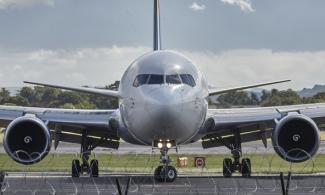
Investigations showed that no fewer than 62 airlines at different times in Nigeria’s aviation history have become extinct due to many factors, including an unfriendly business environment and paucity of funds.
Dozens of airlines that operated both scheduled and non-scheduled flight services have gone moribund since 1960 when Nigeria attained independence from the British colonialists, checks by Daily Trust revealed.
Investigations showed that no fewer than 62 airlines at different times in Nigeria’s aviation history have become extinct due to many factors, including an unfriendly business environment and paucity of funds.
While this is happening at a time the federal government plans to float a new national carrier, experts have cautioned that the new airline might not be insulated from the current challenges, which have weighed down existing airlines and even prevented new ones from starting operations.
Over the years, many airlines in Nigeria have disappeared from the airspace amidst what operators call a “stifling operating environment.”
The list of some of the defunct airlines since independence include; Flash Airline, Kabo Air, Hold Trade Airline, Gas Air, Jambo Express, Chachangi, IRS Airlines, Savannah Airline, Albarka Airline, Intercontinental Airline, Air Mid-West, HAK Air, EAS Airline, Nicon Airways, Virgin Nigeria Airline, Air Nigeria and Falcon Air.
Others are; Sosoliso Airline, Zenith Airline, Barnax Airline, Space World International Airline, Dasab Airline, Fresh Airline, Triax Airline, Bell-View, Freedom Airline, Okada Air, Concord Airline (owned by late Chief MKO Abiola); Associated Airline, Air Taraba (serving Taraba, Borno and Adamawa).
The list also includes; United Air Service, Aras Airline Ltd, Nigeria Global, Nigeria Eagle (which commissioned an aircraft but didn’t fly and had to take it back); Harco Airline, Premier Airline, Al Bashir, Trans-Sahara Airline, ADC, Oriental Airline, Axiom Airline, Forward Air, Slok Air, Das Air and Cargo, Dornier Aviation Nigeria, Al-Dawood, Premium Air Shuttle and Chrome Air Service.
The rest are; Easy Link Aviation, First Nation Airways, Earth Airlines, Afrijet Airlines, Afrimex, Air Vanni, AlHeri Airlines, Arax Airlines, Arab Wings Nigeria, City Link Airlines, Discovery Air, Delta Air Charter, Hamsal Air Services and Emma-Nik Aviation Service.
Chairman of the defunct Trans – Sahara Airline, Alhaji Salihu Yinusa had in the past told Daily Trust that the government had no policy of encouraging indigenous airlines. According to him, while airliners buy aircraft and spare parts in dollars, they price their tickets in naira.
He said, “We buy the aircraft and spare parts with foreign currency, dollars. Our people actually have developed a likeness for very cheap tickets and almost free tickets.
“The second aspect of it is that here in Nigeria, we fly only for maybe from 7: 00 am to 8: 00 pm and aircraft have hours that need to be utilised. In foreign countries, the aircraft flies 24 hours. It only stops when they have to do a service or when there is maintenance on it but here you only fly for a few hours and you park it. So the time you are supposed to be flying, the aircraft is parked. That actually contributes to the failure of us getting revenue to pay for our needs.”
Daily Trust reports that the cost of aviation fuel (Jet A1), which constitutes 40 per cent of the airline’s operating costs has virtually quadrupled in the last year with a litre being sold for N800 per litre. Also sourcing foreign exchange for airlines has become a thorny issue as the operators said they go to the parallel market to buy dollars, which cost N735 to one dollar as of Thursday, October 6, 2022.
There have been complaints over Nigeria’s inability to maintain a national carrier amid equal reservations over the failure of individuals or groups to maintain commercial fleets over time.
Nigeria is said to be a huge market and could make a fortune from a vibrant aviation sector because of its population and business opportunities.
More so despite the current high cost of tickets with a one-way flight on Lagos-Abuja costing as much as N150, 000, the demand for travel on the domestic routes is still high because of insecurity and fear of being kidnapped while traveling on Nigerian roads.
But many cities are still left untouched by airlines in their domestic network and stakeholders say more airlines would bridge the existing gap in domestic flights.
Despite the shutdown of the industry in 2020 occasioned by COVID-19, the industry recovered rapidly on account of the lucrative market and the high demand for travel as data from the Federal Airports Authority of Nigeria (FAAN) indicated that the domestic passenger traffic rose by a significant 43.3 per cent to 9.07 million in 2021 from 13.01 million in 2020, while the international passenger traffic saw a 44.4 per cent increase to 2.32 million from 1.6 million in the previous year.